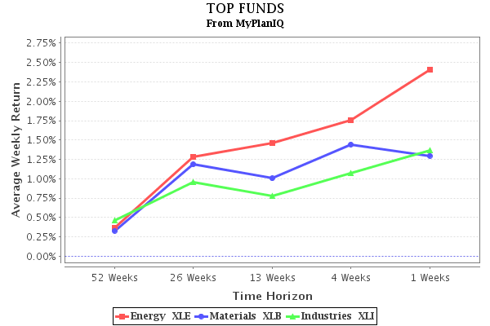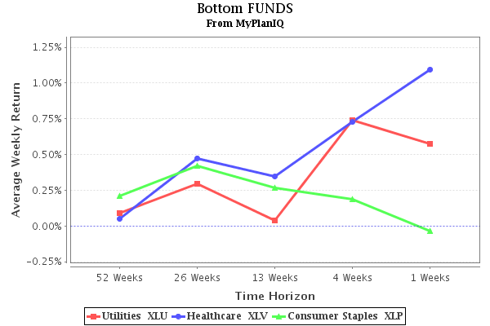Rising Energy Costs: Casting a Cloud over Energy-Dependent Sector ETFs
01/15/2011 0 comments
The relative performance among sector ETFs remained largely unchanged last week, with energy (XLE) retaining its top spot. However, we saw a broad-based drop in trend scores across sectors. Marking a shift in sentiment, consumer discretionary (XLY) dropped to the fourth spot from being second a week ago. By examining the following table, one can gain critical insights into how to build portfolios at the sector level:
|
Assets Class |
Symbols |
01/12 |
01/05 |
Direction |
|
Energy |
XLE |
16.21% |
14.72% |
^ |
|
Materials |
XLB |
13.6% |
14.24% |
v |
|
Industrials |
XLI |
12.87% |
14.01% |
v |
|
Consumer Discretionary |
XLY |
12.11% |
14.32% |
v |
|
Technology |
XLK |
9.71% |
10.35% |
v |
|
Telecom |
IYZ |
8.74% |
13.08% |
v |
|
Financial |
XLF |
8.08% |
9.88% |
v |
|
Consumer Staples |
XLP |
5.21% |
6.52% |
v |
|
Healthcare |
XLV |
4.68% |
5.18% |
v |
|
Utilities |
XLU |
3.25% |
3.65% |
v |
Fundamentals are improving the in the financial sector (XLF), with industry bellwether J.P. Morgan Chase reporting record-breaking profits on Friday. As credit condition has improved, delinquencies have dropped and lending activities are picking up. The industry is still facing headwinds. Litigations centered on mortgage buyback and still weak housing markets will post pressure on the margins.
Energy (XLE) was lifted by rising oil prices. Along with the sharp rise in demand for heating oil and naturals gas driven by the severe winter conditions in the Northeast, the closure of the Trans-Alaska pipeline has helped push oil past $91. One may ask the question of whether rising energy costs would post a thread to the economic recovery and how this would affect the dynamics in sectors (e.g. industrials (XLI), consumer (XLY)) that are exposed to the volatile oil market and that require large energy input.
Some economists have suggested as the U.S. economy becomes more service oriented, with energy costs accounting for less in the overall cost structure of the economy, rising oil prices would have little effect on the overall economy. That said, it’s crucial to recognize that rising energy costs would certainly affect consumer behavior and business spending at least in the short run. Therefore, identifying sectors that would be negatively affected in an event of oil shock is critically important when building a portfolio at the sector level.
For more detailed total return performance, please see here.

labels:investment,
Symbols:XLY,IYZ,XLI,XLB,XLK,XLE,XLF,XLP,XLU,XLV,SPY,QQQQ,IWM,MDY,EFA,VEU,EEM,VWO,IYR,ICF,VNQ,GSG,DBC,DBA,USO,LQD,CSJ,CIU,HYG,JNK,PHB,TLT,IEF,SHY,SHV,BND,AGG,MUB,MBB,
comments 0

